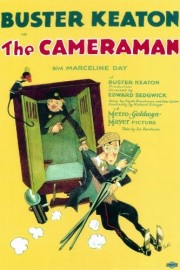The Cameraman
Buster Keaton’s characters just cannot catch a break. Well, not until the last reel of the film, anyway. And his 1928 comedy, “The Cameraman,” is a note-perfect example of that philosophy.
In the film, Keaton plays a street photographer who, seeing the popularity of news reel cameramen, decides to try and break into the business in MGM’s News Reel department, especially after he meets a lovely young woman (Sally, played by Marceline Day) who works at MGM. Unfortunately, Buster’s first adventures as a reel-to-reel cameraman are far from successful, and though they share some mutual enjoyment together, Buster’s attempts to woo Sally aren’t much better. However, as always, Buster finds his way to success with both his career and his love.
Buster Keaton’s real life was about to hits rough times as well, much like his character in this film. “The Cameraman” was the first film Keaton made for MGM, the legendary lion of movie studios whose financial tribulations have, unfortunately, made more headlines than their cinematic output of late. Before he went to work for MGM, Keaton was an independent filmmaker, financed by his brother-in-law, Joe Schenck, and free to play around with stunts and stories at his leisure. Unfortunately, the studio system allowed for little-to-none of that freedom, and the great artist Keaton was before the move (as exemplified by “The General,” “Our Hospitality,” and “Sherlock Jr.”) became a hired hand, and his personal touch became lost in studio formula. His career never recovered, and Keaton went on to call the decision, “the biggest mistake of his career.”
All that being said, “The Cameraman” remains one of Keaton’s best and most entertaining films. He still had enough freedom and enough control over the film to create memorable set pieces such as: the one of Buster, alone, at Yankee’s Stadium, hoping to film a game, but ending up playing one of his own; the extended series of pratfalls and unfortunate events Keaton endures at a public pool while on a Sunday walk with Sally; a furious shootout in Chinatown when Buster’s cameraman has the chance to prove his mettle; and watching Buster go up and down the stairs of his apartment building, sometimes going too far, to get to the phone when Sally calls. Apart from being very funny, and sometimes, wickedly inventive, Keaton’s films always have a strong heart to them, and I’m not talking about the sentiment Charlie Chaplin trafficked in; there’s real courage in not only what Buster puts on-screen as a filmmaker, but in what his characters project– that no matter what life puts in your way, a little courage, and a lot of perseverance, will get you a long way in life, even when it looks like things just aren’t meant to go your way.










